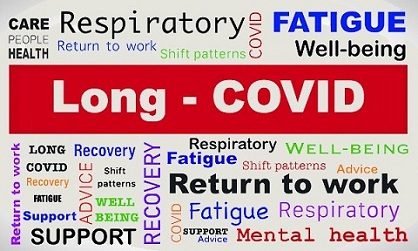Long-COVID-19 News: Study Shows That Survivors Have A 59% Increased Risk Of Dying Within Six Months After Contracting The SARS-CoV-2!
Source: Long-COVID-19 News Apr 23, 2021 4 years, 10 months, 2 days, 12 hours, 4 minutes ago
Long-COVID-19 News: An alarming study published in the peer reviewed journal: Nature, shows that "Long Haul" COVID-19 can kill patients months after infection.
https://www.nature.com/articles/s41586-021-03553-9

Although the acute clinical manifestations of COVID-19 are well characterized its
post-acute sequalae have not been comprehensively described. Here, we use the national healthcare databases of the US Department of Veterans Affairs to systematically and comprehensively identify 6-month incident sequalae including diagnoses, medication use, and laboratory abnormalities in 30-day survivors of COVID-19.
The researchers from VA Saint Louis Health Care System show that beyond the first 30 days of illness, individuals with COVID-19 exhibit higher risk of death and health resource utilization.
The high dimensional approach identifies incident sequalae in the respiratory system and several others including nervous system and neurocognitive disorders, mental health disorders, metabolic disorders, cardiovascular disorders, gastrointestinal disorders, malaise, fatigue, musculoskeletal pain, and anemia.
The team shows increased incident use of several therapeutics including pain medications (opioids and non-opioids), antidepressants, anxiolytics, antihypertensives, and oral hypoglycemics and evidence of laboratory abnormalities in multiple organ systems. Analysis of an array of pre-specified outcomes reveals a risk gradient that increased across severity of the acute COVID-19 infection (non-hospitalized, hospitalized, and admitted to intensive care).
The study findings show that beyond the acute illness, substantial burden of health loss spanning pulmonary and several extrapulmonary organ systems is experienced by COVID-19 survivors. The results provide a roadmap to inform health system planning and development of multidisciplinary care strategies to reduce chronic health loss among COVID-19 survivors
To date, across the US, tens of thousands of people who were infected with SARS-CoV-2, the virus that causes COVID-19, have struggled with a buffet of debilitating symptoms that made it impossible for them to work or live normal lives. Many of those who were eligible sought disability as baffled scientists tried to determine the cause of the "long hauler" syndrome, as it has come to be known.
Mainstream media outlets like the Washington Post and New York Times have chronicled the experiences of individuals struggling with "long hauler" syndrome months after they first contracted COVID-19.
Certain patients noted that, while they more or less felt fine, their sense of smell and taste had yet to return. Others complained that a persistent "brain fog" had settled over them.
With no other choice as doctors were offering few answers, many sufferers turned to online communities to pool their experiences.
Alarmingly, the study findings showed that "long haulers" are at much higher risk of dying from their protracted symptoms.
Shockingly the
data showed survivors had a 59% increased risk of dying within six months after contracting the SARS-CoV-2 virus!
Importantly this excess mortality translates into about 8 extra deaths per 1,000 patients. That's worsening the pandemic’s hidden toll amid growing recognition that many patients require readmission, and some die, weeks after the viral infection abates.
Dr Ziyad Al-Aly, chief of the research and development service at the St. Louis VA Medical Center in Missouri, who led the study told Thailand Medical News, "When we are looking at the acute phase, we’re only pretty much looking at the tip of the iceberg. We’re starting to see a little bit beneath that iceberg, and it’s really alarming.”
Dr Al-Aly and his colleagues documented the cascade of debilitating symptoms that plague long haulers even months after their diagnosis: from blood clots, stroke, diabetes and breathing difficulties to heart, liver and kidney damage, depression, anxiety and memory loss.
Globally, more than 145 million people have tested positive for COVID-19, and more than 3.075 million have died from the disease. As for how many become long haulers, some other studies have put the number at roughly 35 percent. However nobody really knows, and those who pass away months later from the condition typically aren't counted among COVID-19 deaths.
Furthermore adding to the host of risk factors, long-haulers required increased use of various medications, including antidepressants and opioids.
Dr Al-Aly added, "We worry about potential spikes in suicide or potential spikes in overdose of opioids.”
Simply by looking at the numbers from a broader perspective, the study team found that patients with COVID-19 who survived hospitalization had a 51% higher risk of dying compared with 13,997 influenza patients who also had been hospitalized. Dr Al-Aly, who is also an assistant professor of medicine at the Washington University School of Medicine, said he hoped the research would provide a roadmap to inform health-system planning and care strategies to mitigate chronic ill health among Covid-19 survivors, especially in the U.S.
He added, "Let’s not act surprised two years down the road, when people start committing suicide. We did not do very well preparing and dealing with COVID. Let’s not make that mistake a second time."
For more
Long COVID-19 News, keep on logging to Thailand Medical News.
